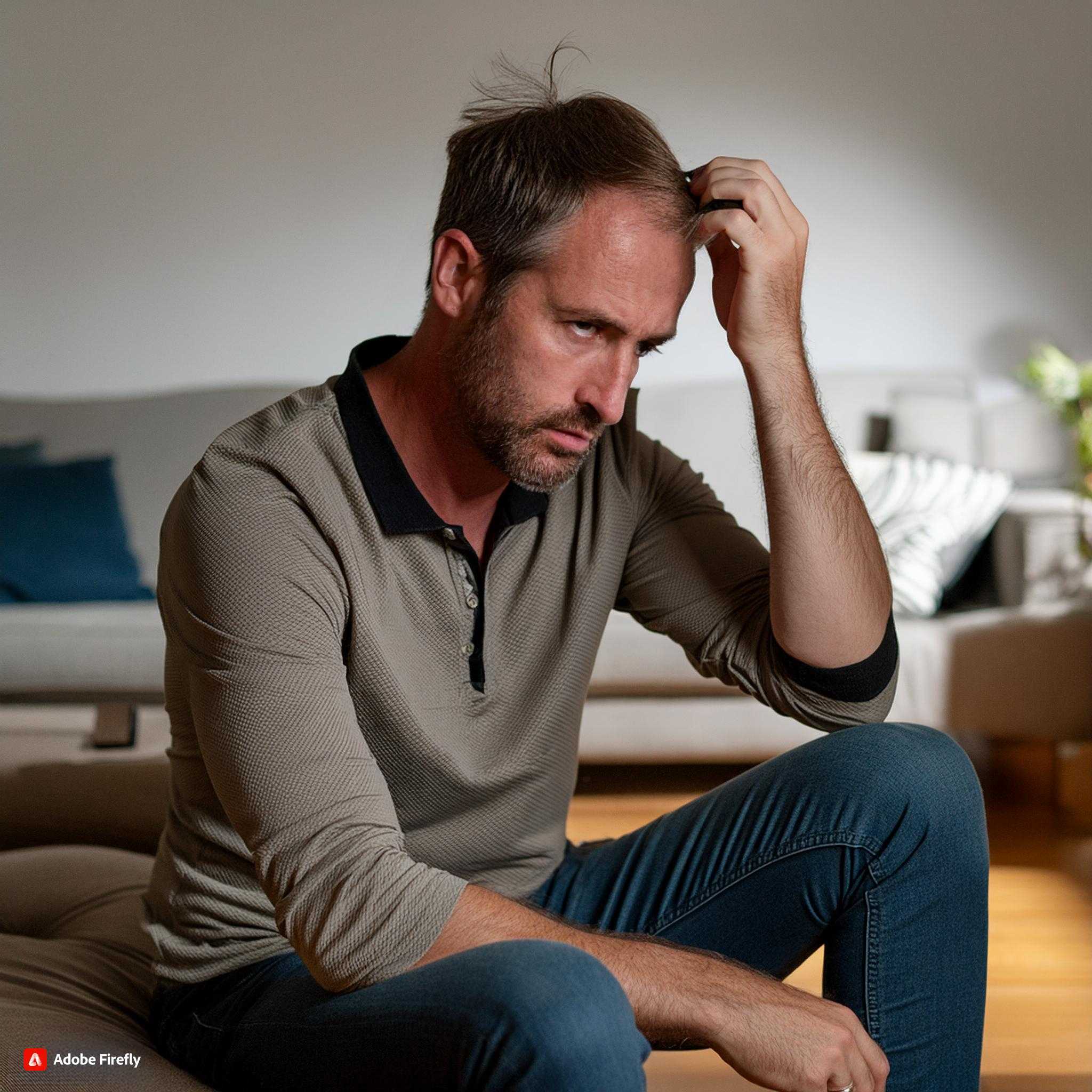
Amelia Thompson, MD
Jan 14, 2024
The Psychological Impact of Hair Loss on Men and How to Cope



The Psychological Impact of Hair Loss on Men and How to Cope
Hair loss is a common issue that affects many men, often leading to significant psychological distress. The emotional impact can be profound, influencing self-esteem, confidence, and overall mental health. Let’s explore the psychological effects of hair loss and discuss effective strategies to cope with these changes.
Understanding the Psychological Impact
Hair loss, while a physical change, often has deep emotional and psychological implications. Here’s how it can affect men:
Self-Esteem and Confidence
Impact: Hair is often associated with youth and vitality. Losing it can make men feel less attractive and older than they are.
Result: This can lead to a decrease in self-esteem and confidence, affecting both personal and professional life.
Social Anxiety
Impact: Men experiencing hair loss might become self-conscious about their appearance, leading to social withdrawal.
Result: Avoiding social situations, feeling embarrassed in public, and a general decline in social interactions.
Depression and Anxiety
Impact: The emotional toll of hair loss can lead to feelings of sadness, frustration, and helplessness.
Result: These feelings can contribute to depression and anxiety, requiring professional mental health support.
Body Image Issues
Impact: Hair loss can alter a man’s perception of his body image, leading to dissatisfaction and negative self-perception.
Result: This can affect relationships, as men may feel less desirable to their partners.
Coping Strategies
Coping with the psychological impact of hair loss involves addressing both the emotional and physical aspects of the condition. Here are some strategies to help manage and overcome these challenges:
Seek Professional Help
Therapy: Talking to a therapist or counselor can provide a safe space to express your feelings and develop coping strategies.
Support Groups: Joining a support group with others experiencing hair loss can provide a sense of community and understanding.
Educate Yourself
Knowledge: Understanding the causes and treatments for hair loss can empower you and reduce feelings of helplessness.
Resources: Read reputable sources and consult with healthcare professionals to get accurate information about hair loss.
Consider Treatment Options
Medical Treatments: Explore non-surgical treatments like Minoxidil and Finasteride or consult with a dermatologist for advanced therapies.
Cosmetic Solutions: Look into wigs, hairpieces, or scalp micropigmentation to improve your appearance and confidence.
Embrace Lifestyle Changes
Healthy Diet: A balanced diet rich in vitamins and minerals can promote hair health and improve overall well-being.
Stress Management: Practice stress-relief techniques like meditation, yoga, or regular exercise to improve mental health and reduce hair loss triggered by stress.
Focus on Self-Care
Grooming: Maintaining a well-groomed appearance, even with hair loss, can enhance your self-image.
Skincare: Pay attention to your skincare routine to keep your scalp healthy and improve your overall appearance.
Reframe Your Perspective
Positive Thinking: Focus on the positive aspects of your life and the qualities that make you unique beyond your hair.
Role Models: Look up to confident, bald role models who embrace their appearance and live fulfilling lives.
Open Communication
With Loved Ones: Talk to your family and friends about your feelings. Their support can be invaluable.
With Partners: Be open with your partner about your insecurities. A supportive partner can help you feel more confident and accepted.
Embrace Your Journey
Hair loss can be a challenging experience, but it doesn’t have to define you. By understanding the psychological impact and adopting effective coping strategies, you can manage the emotional distress and regain your confidence. Remember, you are not alone, and seeking support from professionals and loved ones can make a significant difference.
Take control of your hair loss journey and discover personalized solutions on our website. Get your plan today and start feeling like yourself again!
The Psychological Impact of Hair Loss on Men and How to Cope
Hair loss is a common issue that affects many men, often leading to significant psychological distress. The emotional impact can be profound, influencing self-esteem, confidence, and overall mental health. Let’s explore the psychological effects of hair loss and discuss effective strategies to cope with these changes.
Understanding the Psychological Impact
Hair loss, while a physical change, often has deep emotional and psychological implications. Here’s how it can affect men:
Self-Esteem and Confidence
Impact: Hair is often associated with youth and vitality. Losing it can make men feel less attractive and older than they are.
Result: This can lead to a decrease in self-esteem and confidence, affecting both personal and professional life.
Social Anxiety
Impact: Men experiencing hair loss might become self-conscious about their appearance, leading to social withdrawal.
Result: Avoiding social situations, feeling embarrassed in public, and a general decline in social interactions.
Depression and Anxiety
Impact: The emotional toll of hair loss can lead to feelings of sadness, frustration, and helplessness.
Result: These feelings can contribute to depression and anxiety, requiring professional mental health support.
Body Image Issues
Impact: Hair loss can alter a man’s perception of his body image, leading to dissatisfaction and negative self-perception.
Result: This can affect relationships, as men may feel less desirable to their partners.
Coping Strategies
Coping with the psychological impact of hair loss involves addressing both the emotional and physical aspects of the condition. Here are some strategies to help manage and overcome these challenges:
Seek Professional Help
Therapy: Talking to a therapist or counselor can provide a safe space to express your feelings and develop coping strategies.
Support Groups: Joining a support group with others experiencing hair loss can provide a sense of community and understanding.
Educate Yourself
Knowledge: Understanding the causes and treatments for hair loss can empower you and reduce feelings of helplessness.
Resources: Read reputable sources and consult with healthcare professionals to get accurate information about hair loss.
Consider Treatment Options
Medical Treatments: Explore non-surgical treatments like Minoxidil and Finasteride or consult with a dermatologist for advanced therapies.
Cosmetic Solutions: Look into wigs, hairpieces, or scalp micropigmentation to improve your appearance and confidence.
Embrace Lifestyle Changes
Healthy Diet: A balanced diet rich in vitamins and minerals can promote hair health and improve overall well-being.
Stress Management: Practice stress-relief techniques like meditation, yoga, or regular exercise to improve mental health and reduce hair loss triggered by stress.
Focus on Self-Care
Grooming: Maintaining a well-groomed appearance, even with hair loss, can enhance your self-image.
Skincare: Pay attention to your skincare routine to keep your scalp healthy and improve your overall appearance.
Reframe Your Perspective
Positive Thinking: Focus on the positive aspects of your life and the qualities that make you unique beyond your hair.
Role Models: Look up to confident, bald role models who embrace their appearance and live fulfilling lives.
Open Communication
With Loved Ones: Talk to your family and friends about your feelings. Their support can be invaluable.
With Partners: Be open with your partner about your insecurities. A supportive partner can help you feel more confident and accepted.
Embrace Your Journey
Hair loss can be a challenging experience, but it doesn’t have to define you. By understanding the psychological impact and adopting effective coping strategies, you can manage the emotional distress and regain your confidence. Remember, you are not alone, and seeking support from professionals and loved ones can make a significant difference.
Take control of your hair loss journey and discover personalized solutions on our website. Get your plan today and start feeling like yourself again!
© 2024 Hairful. All rights reserved.
© 2024 Hairful. All rights reserved.
© 2024 Hairful. All rights reserved.